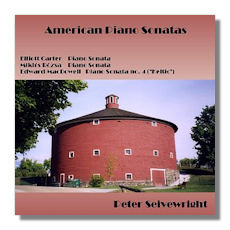
The Internet's Premier Classical Music Source
Related Links
-
Carter Reviews
Macdowell Reviews
Rózsa Reviews - Latest Reviews
- More Reviews
-
By Composer
-
Collections
DVD & Blu-ray
Books
Concert Reviews
Articles/Interviews
Software
Audio
Search Amazon
Recommended Links
Site News
 CD Review
CD Review
American Piano Sonatas

- Elliot Carter: Piano Sonata
- Miklós Rózsa: Piano Sonata
- Edward Macdowell: Piano Sonata #4 in E minor
Peter Seivewright, piano
Divine Art DDA25052 78m DDD
This CD dedicated to piano sonatas by American composers focuses on three very diverse musicians and their keyboard works, which are as stylistically different as their careers.
Elliott Carter celebrated his centenary last year, and amazingly enough his creative muse is still very active. He is today revered as one of America's greatest composers and his large corpus of works testify to his total dedication to his art. The magnificent Piano Sonata dates from 1945-46 and Carter's strong musical personality is as firmly embedded in this work as in anything he has written. In two movements, the music is either fast or extremely fast, although long slow lyrical sections punctuate the beginning and end of the second movement, which also includes one of the most monumental fugues in all 20th century piano repertoire.
Miklós Rózsa (1907-1995) will always be remembered as one of the very greatest composers of film music, but his output includes many classical pieces such as the Violin and Viola concertos and the Hungarian Serenade. Rózsa always considered his piano sonata as the finest of all his concert works and although this judgment might be slightly amiss, the piece is full of vigorous sounds. The extremely fast "Bartok-goes-to-Hollywood" third movement is as impressive a finale as anything that Rózsa wrote for any of his concert oeuvre.
Edward Macdowell (1860-1908) embraced the ideals of German romanticism, but his Scotch-Irish roots led him to fall in love with the great Gaelic and Celtic legends. The composer insisted that the "Keltic" Sonata was not in any sense "programme music", but the second and third movements are unquestionably a portrait of the beautiful Deirdre and the heroic Warrior Cuchulin.
Seivewright's remarkable talent contributes immeasurably to the cause of these sonatas and his attention to detail is indeed faultless. Some "tough" repertoire zestfully performed and captured in clean balanced sound.
Copyright © 2009, Gerald Fenech




















